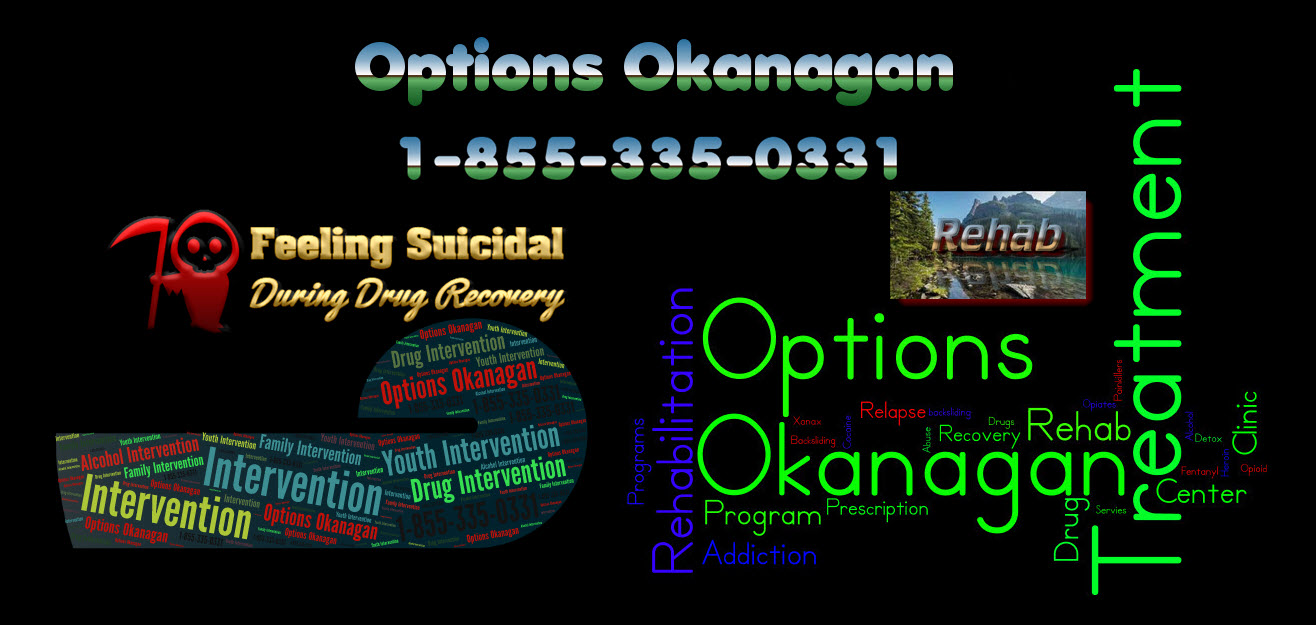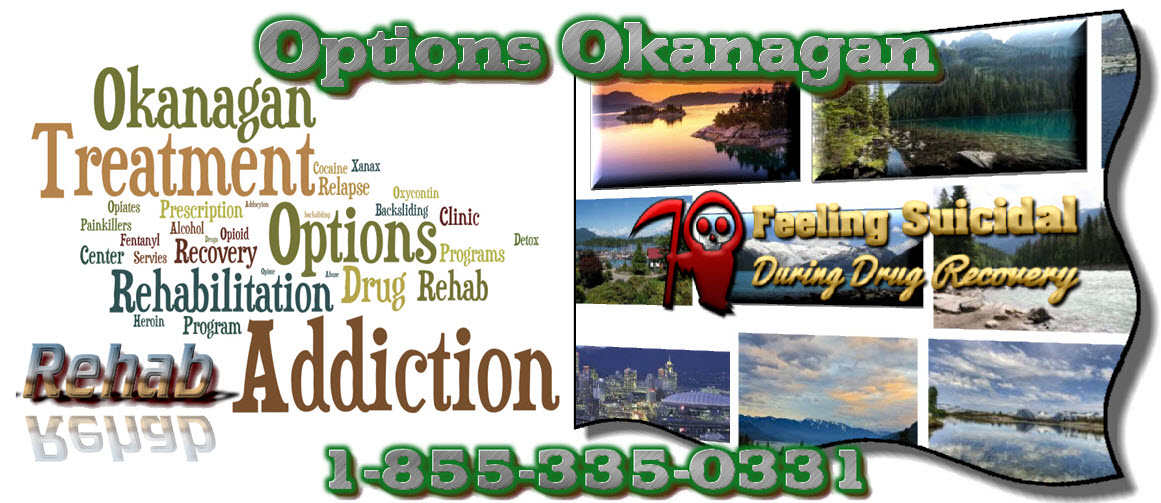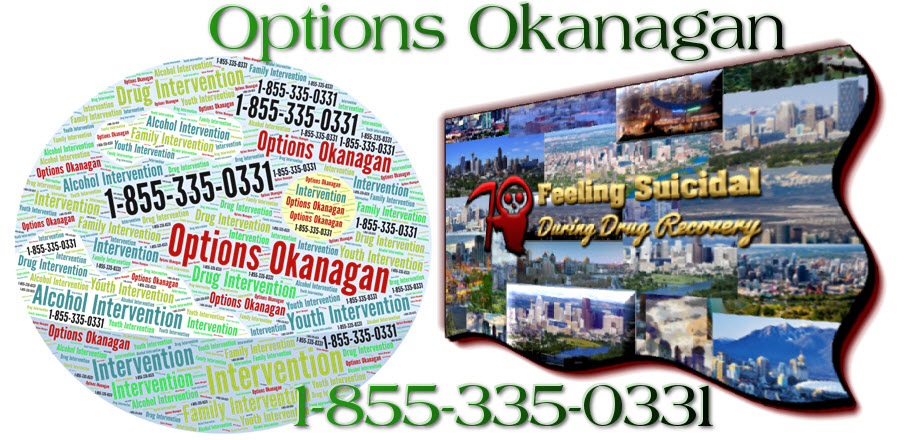Recognizing the many suicidal tendencies in addicts – Drug opioid addiction recovery in British Columbia and Alberta – Options Treatment Center in Kelowna, British Columbia treating drug, opioid, opiate, fentanyl, heroin and alcohol addiction and recovery.
Drug Rehab In Alberta And BC
Mental health disorders and addiction often go hand-in-hand. Mood and emotional problems like anxiety and depression often accompany substance abuse and addiction. It may be a case of alcohol or drugs being used to self-medicate an underlying mental health issue or the abuse of a substance could aggravate an existing condition or even be the cause of a mental illness. This combination can be fatal and it is critical to be aware that and addict with a mental health disorder can develop suicidal tendencies, how to recognize the symptoms and what help is available to prevent a devastating end result.
Suicide Risk Factors – Addiction and Rehab in Alberta and BC
Both substance abuse and suicide are considered to be high risk factors for suicide as are anxiety, depression and other mood disorders. An addict with a mental health problem is therefore at a much higher risk of suicide. Keeping in mind that drugs and alcohol have mood-altering properties that can result in extreme depression and feelings of hopelessness, there is also the fact that addiction disrupts the ability to interact socially and relate to others in a meaningful way which is crucial to good mental health.
An addict going through recovery is also at risk of suicide. A mental health condition like depression is not likely to simply disappear during recovery whether the condition developed as a result of substance abuse or was already a latent problem. An addict with mental health issues who experienced suicidal tendencies while abusing a substance is likely to continue to do so throughout recovery and in the future.
Another risk factor for suicide during recovery is a family history of mental illness or substance abuse. Using alcohol or marijuana as a gateway substance is another factor that may lead to suicidal tendencies. It is critical to understand the warning signs of suicide related to alcohol and drug abuse whether a loved one is an addict or in recovery.
The Many Warning Signs Of Suicide
If you have a loved one who suffers from addiction problems, it is essential to know and understand the signs of suicide whether they have a mental health condition like depression or not. Keeping an eye out for any of the following warning signs can mean the difference between life and death:
1. Talking About Suicide
It is a common misconception that verbal suicide threats are not serious. A person who is talking about suicide and dying is at a high risk of following through on their words so take any talk of suicide seriously.
2. Signs Of Hopelessness
Hopelessness may not always lead to suicide but is a warning sign that should be taken seriously. A person who expresses no hope for the future or expresses feelings that nothing will ever change is at risk.
3. Withdrawal
Both addicts and those suffering from depression or other mood disorders seek to be alone and withdraw from society preferring isolation. This is however also a sign of suicidal tendencies.
4. Self-Loathing
Believing that the world would be better off without them or that they have become a burden are definite warning signs. Pay attention to comments like “I hate myself.“.
5. Seeking A Means To Die
A person who has recently acquired a gun or is accumulating prescription medication is probably looking for a way to kill themselves.
6. Planning Ahead
A loved one who suddenly starts getting their affairs in order such as making a will or giving away precious belongings is probably serious about suicide.
7. Relapse
Many addicts use substances to self-medicate a mental health disorder and may return to abusing substances after a period of recovery if they are having suicidal thoughts. They may also become self-destructive and simply no longer care what happens to them and begin using again. This is an extremely important warning sign to look out for.
Suicidal tendencies are aggravated by addiction in a person with a mental health problem and vice versa. If you notice any of the suicide warning signs, act immediately and get professional help as soon as possible. Remember that your awareness and actions could save the life of a loved one.
Options Okanagan Opiate and Alcohol Treatment Centers in Kelowna, Salmon Arm and Vancouver, British Columbia – Men and Women are recovering and healing from Alcohol and Drug Abuse at our treatment center here in the Okanagan right now.
Our unique and distinctive Opiate Drug and Alcohol treatment program allows men and women to come in from Calgary as well as Edmonton as we offer airport pickup.
Numerous clients come to us from Vancouver, Calgary and Edmonton and other locations in Alberta and even other provinces for Opiate addiction treatment, heroin drug treatment, many other drug and alcohol addictions for rehabilitation because of the uniqueness of our treatment center.
Our (Kelowna ) Alcohol and Drug Treatment Program Location:
(Not Mailing Address) Contact Us – Web Page
For Mail Delivery :: Please contact each center for correct mailing addresses, also this location is the location of our residential treatment programs in Kelowna. Please call Toll Free 1-855-335-0331 to contact the treatment center you are going to for the address and directions.
Options Okanagan Drug and Opiate Treatment Center
551 Sherrydale Crescent, Kelowna, British Columbia, V1V 2E6
Toll Free Phone Number : 1-855-335-0331



